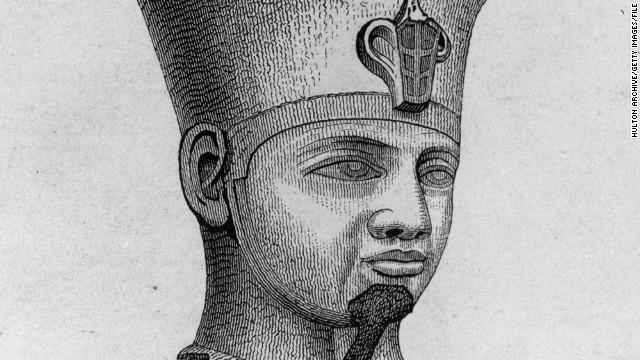
(CNN) -- Forget old conspiracy theories about snake bites and fatal poisons. Egyptian King Ramesses III died after a brutal throat slashing, a new study says.
The study provides the latest twist in a mystery that has long perplexed researchers.
Did a venomous viper take him out? Poison? An assassination plot in a reign tainted by war?
And if it were the latter, who did it?
Researches say he died at the hands of a killer in a plot planned by one of his wives and a son who wanted to succeed him.


Scans conducted after layers of bandages were removed revealed a deep cut in Ramesses III's throat, probably made by a sharp knife during a royal coup, according to a study published by the British Medical Journal.
"Our CT analysis provides evidence that conspirators killed Ramesses III by cutting his throat," the study says.
His throat, neck and arteries were brutally slashed, causing an immediate death, according to the study, which highlights his final moments.
"Damage to the throat after death appears to be unlikely, because the collar around the mummy's neck was intact and undamaged at the unwrapping in 1886, where a thick layer of bitumen was removed with a hammer from the mummy," the study says.
Speculation has raged over what led to his death.
"Further evidence of an assassination comes from the presence of a Horus eye amulet in the wound," the study says. "The presence of the amulet deep in the soft tissue of the wound together with the homogeneous material that penetrated the wound up to the bone substantiate the supposition that the wound was already present at the time of embalming. "
The study singles out one of his wives and her son as conspirators in the killing. A trial found the son, Pentawere, guilty, leading him to take his own life, it says.
The unusual mummification of unknown man E, believed to be Pentawere, points to a "nonroyal burial" that includes use of goat skin to cover his body. The procedure appears to be a punishment for conspiring against the king, according to the study.
"Use of goat or sheep skins in dynastic burials was rare because these materials were regarded ritually impure," it says.
A genetic study shows they had common lineage.
King Ramesses III, who was referred to as "the great god" in the study, ruled from about 1187 until 1156 BC.
He was succeeded by another son, who was his preferred heir.
http://edition.cnn.com/2012/12/18/world/africa/egypt-king-conspiracy/index.html?hpt=iaf_mid
No comments:
Post a Comment